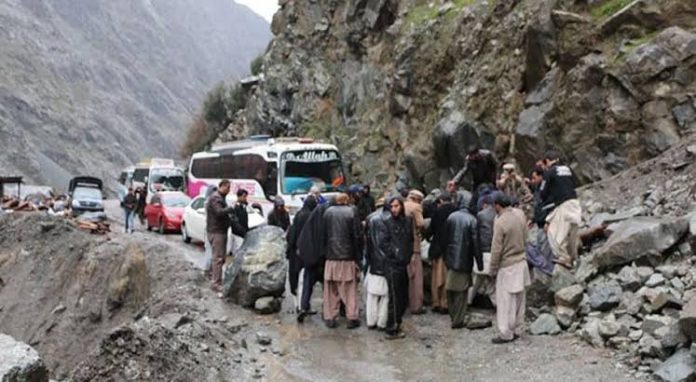The Karakoram Highway (KKH), a vital road link connecting Gilgit-Baltistan (GB) and Khyber Pakhtunkhwa (KP) in Pakistan, has been severely affected by heavy rains triggering landslides. This has resulted in the stranding of thousands of passengers, disrupting travel and causing significant challenges for both locals and travelers alike.
The impact of the landslides is extensive, with the KKH blocked at approximately 50 points, including critical areas such as Shetan Pari, Lotar, Hurban Nullah, Thor Nullah, and parts of GB’s Diamer district. The National Highway Authority (NHA) is collaborating with contractor companies to clear these blockades, aiming to restore accessibility for all types of vehicular traffic by Wednesday morning. However, the scale of the blockages and the challenging terrain pose significant obstacles to the clearance efforts.
The adverse weather conditions, characterized by three days of disruptive rain and snowfall, have compounded the situation. This has led to additional challenges such as power outages and damage to vehicles, exacerbating the difficulties faced by those stranded along the KKH. Furthermore, the suspension of flights between Islamabad, Skardu, and Gilgit, coupled with disruptions to mobile and internet connectivity in many areas, further isolates the region and hampers communication and relief efforts.
The GB government’s issuance of an alert predicting heavy rainfall and snow from Feb 19 to 27 underscores the ongoing threat posed by adverse weather conditions. This forecast highlights the need for proactive measures to mitigate the impact of potential further disruptions and to ensure the safety and well-being of residents and travelers in the affected areas.
The situation along the Karakoram Highway underscores the vulnerability of infrastructure and communities in mountainous regions to extreme weather events. Effective coordination between government agencies, contractor companies, and local communities is crucial in addressing the immediate challenges posed by the landslides and in implementing long-term measures to enhance resilience and preparedness in the face of future hazards.


